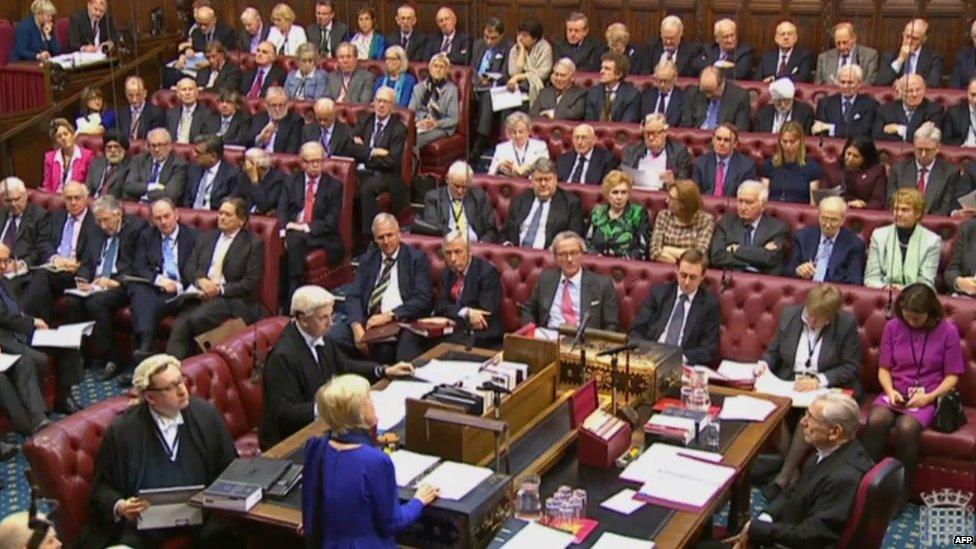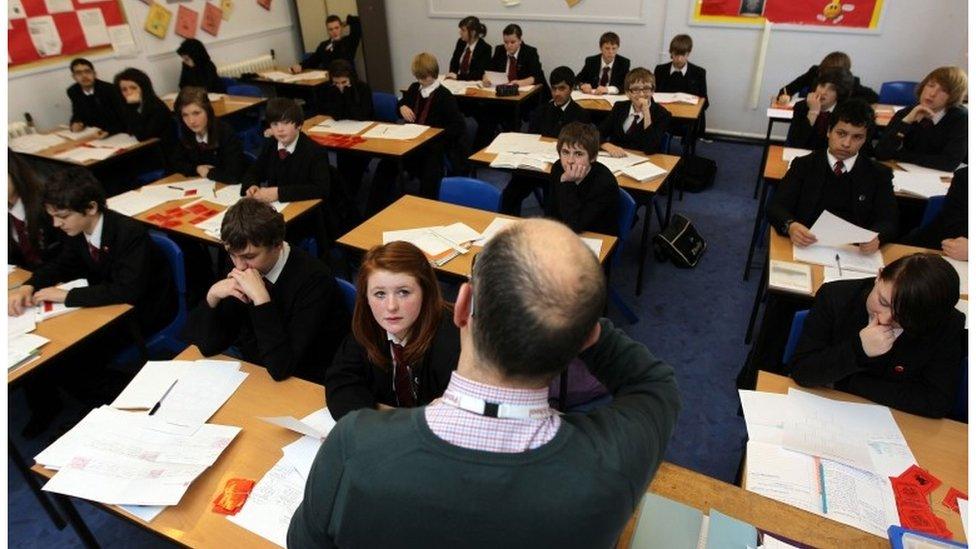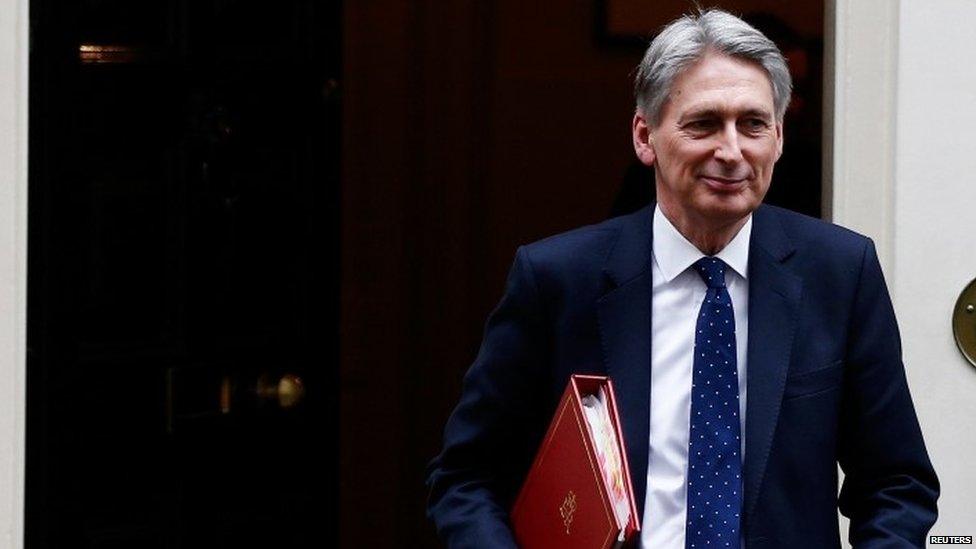The week ahead in Parliament: Budget and Brexit
- Published

Peers will get their teeth into the Brexit bill again
Having amended the government's Brexit Bill by a thumping majority this week, the big question for next week in Westminster is whether peers will do it again, potentially more than once.
It looks pretty likely that the cross-party amendment on giving Parliament a final vote on the Brexit deal will be pushed to a division.
And so will the Lib Dem amendment to give people what they call "a final say on the final deal" and what others call a second referendum. Potentially there could be further votes on issues like the Brexit implications for Northern Ireland.
The expectation is that the amended bill will get its Third Reading on Tuesday evening....but the ritual of Parliamentary ping-pong, where the Bill then bounces between the Lords and Commons until its final form can be agreed, will have to be postponed for a while.
The opportunity for the Commons to accept or - more likely - reject the changes made by peers will be blocked by the debate on the Budget, which will occupy the Commons into the following week.
So there will be a week or more for the pressure to build on MPs before they vote on the issue - and during the interval the Commons Brexit Select Committee will publish a report on the rights of UK and EU citizens (on Sunday) in good time to influence the vote.
It's a sign of the times that Brexit could eclipse what's normally a highlight of the Parliamentary year, but there will be plenty to watch out for in what will be the last full-scale budget in March. Next year it will be downgraded to a mere "Spring Statement" with the Budget moving to the autumn.
First up the forecasts for government debt, with the Treasury continuing to seek further austerity savings across government. Second, whether there will be an injection of extra funds to defuse the row over business rates, and third, whether the government will put more money into adult social care, and maybe even signal a long term review of the system.
The Westminster buzz is that the public finances are in better shape than expected - but that any spare cash will be stashed away in a Brexit war chest, rather than spent now.
Elsewhere, there's important action on the Children and Social Work Bill, where the government has delighted cross-party campaigners by bringing forward amendments to make relationship educations (emphatically not sex education) compulsory at primary school level.
Cross-party pressure from family values campaigners like the influential Conservative backbencher, David Burrowes, and supporters of extended sex education like the Women and Equalities Committee Chair, Maria Miller, and Labour's Sarah Champion, appears to have secured its goal.
Both groups were persuaded that a new approach was needed to tackle the problem of sexting and sexual harassment in schools.
And the government may also be tested on a couple of issues on the Higher Education Bill, where there are two days of Report Stage consideration in the Lords.

Monday 6 March

MPs will debate a petition on footwear in the workplace
The Commons opens at 14.30 BST with Home Office Questions - and then watch out for any ministerial statements or urgent questions at 3.30.
In particular, the Culture Secretary Karen Bradley is expected to update MPs on the proposed merger between Sky and 21st Century Fox, which has now been formally notified to the European Commission.
An earlier attempt at this was withdrawn during the 2010 Parliament, in the wake of the hacking scandal, and the issue remains highly sensitive.
She must decide by 17 March 17 whether to ask the regulator, Ofcom, to carry out a public interest test.
Then MPs move on to the Second Reading debate of the Vehicle Technology and Aviation Bill - this aims, among other things, to create a legal framework for insuring automated vehicles, because at the moment the law does not provide for them, require fuel retailers to provide charge points for electric cars, and create a new criminal offence of shining a laser at any means of transport.
There's also a separate draft bill to create a UK spaceport, which will go out for pre-legislative scrutiny by the Commons Science and Technology Committee.
In Westminster Hall at 16.30 GMT MPs debate e-petition 129823, external which says that dress code laws should be changed so that women have the option to wear flat formal shoes at work, if they wish, arguing that "current formal work dress codes are out-dated and sexist".
In the Lords at 14.30 GMT the usual half hour of questions to ministers is followed by the first Report Stage day on the Higher Education and Research Bill. Expect votes on tiered Higher Educational establishments - gold, silver, bronze universities.
Watch out too for a short debate on recent legislation on assisted dying in North America; and whether those laws provide an appropriate basis for legislation in England and Wales, led by Labour's Baroness Jay of Paddington.
This suggests that the Lords assisted dying lobby have not entirely given up following the defeat of Rob Marris's bill in the Commons, last year.

Tuesday 7 March

The subject of relationship education will be on the Commons curriculum
MPs begin at 11.30 GMT with Justice Questions, followed by a Ten Minute Rule Bill on the Queen's Sapphire Jubilee from the Conservative, Andrew Rosindell.
The day's main event is the Report stage of the Children and Social Work Bill (see above). The Conservative Sir Edward Leigh has fired in an amendment to the sex and relationship education proposals, to allow a parent to request that their child be wholly or partly excused.
Labour MPs are also proposing new clauses to ensure that children in care are allowed reasonable contact with their siblings, and to revoke provisions in the Bill that enable local authorities in England and Wales to place children in secure accommodation in Scotland, and vice versa.
There are a battery of amendments on child safeguarding issues including a big cross-party amendment on requiring regular reports by local councils on their ability to provide proper safeguarding services for children.
In Westminster Hall, the debates are on: beer duty (9.30 GMT); the Coast to Coast Walk (11.00 GMT); the O'Neill review into antibiotic resistance (14.30 GMT); the sale of student loans (16.00 GMT) and social care in Liverpool (16.30 GMT).
My Committee pick is the Home Affairs session, with Rob Wainwright, the Director of Europol on policing and security issues across the EU and Britain's role, post-Brexit (14.15 GMT).
This is a key Brexit issue, and one where the Prime Minister has made clear her enthusiasm for continued British participation in Europol.
In the Lords, peers open for business at the earlier than usual time of 11.00 GMT to provide extra debating time for the Report Stage consideration of the European Union (Notification of Withdrawal) Bill - breaking off, briefly, at 14.30 GMT for their usual half an hour of questions to ministers.
After the Report Stage, three hours of Brexit breathing space is provided while the amended version of the Bill is knocked into shape. During this interval there will be a 90 minute debate on the economic and environmental benefits of shale gas development in the UK, led by the former trade minister Lord Truscott.
And then there may be an adjournment for a while, before peers can return to the European Union (Notification of Withdrawal) Bill, for the Third Reading debate. This is normally a rather sonorous formality, but may not be on this occasion....

Wednesday 8 March

Philip Hammond will present his first - and the last Spring Budget
The Commons opens at 11.30 GMT with Welsh Questions followed by Prime Minister's Questions at noon. And then it's onto the Budget (see above).
The day's Westminster Hall debates are on: financial support for apprentices (9.30 GMT); compensation and the Pandemrix vaccine (11 GMT); the proposed ban on microbeads (14.30 GMT); extension of the right to buy to tenants of housing associations in Bedford (16.00 GMT) and broadband speeds (16.30 GMT).
In the Lords at 16.00 GMT it's the second Report Stage day on the Higher Education and Research Bill. There will also be a short debate on the UK's exports strategy.

Thursday 9 March

Is Scotland facing a demographic time bomb, MPs will ask
MPs open at 09.30 GMT with Exiting the European Union Questions, followed by the weekly Business Statement from the Leader of the House - before moving on to day two of the Budget debate.
In Westminster Hall, from 13.30 GMT, there's a debate on the Scottish Affairs Select Committee report on the Demography of Scotland and the implications for devolution.
This looks at the policy problems posed by the combination of Scotland's slower population growth, its ageing population and lower life expectancy, particularly for health and care services, potentially increasing the demands on NHS Scotland and Scottish social care services in the future.
At 15.00 GMT the subject is human rights and the political situation in Turkey.
In the Lords at 13.00 GMT, the main event is the Second Reading of the Criminal Finances Bill which aims to tackle money laundering, terrorist finance and corruption the UK and overseas, in the wake of the Panama papers revelations of industrial scale tax avoidance.
The National Crime Agency estimates that up to £90bn may be laundered in the UK each year. The Bill was criticised in the Commons for failing to include penalties for companies which permitted their staff to facilitate money laundering, or do more to reveal the beneficial owners of assets, or deal with the lack of corporate transparency in Britain's crown dependencies and overseas territories.
That is followed be a debate to mark International Women's Day.

Friday 10 March
The Lords meets at 10.00 GMT to debate the detail of a series of private members bills from the Commons. First up will be the Second Reading of the Preventing and Combating Violence Against Women and Domestic Violence Bill - which incorporates the Istanbul Convention into UK law.
Next the Committee stage of the Homelessness Reduction Bill - which puts new obligations on local councils to help and advise people who have lost their homes or are in danger of doing so. Then there's the Committee stage of the completely uncontroversial Parking Places (Variation of Charges) Bill - which gives local authorities more flexibility over parking charges.
And finally there's a Second Reading debate on the Political Parties (Funding and Expenditure) private members' Bill [HL] from the Lib Dem, Lord Tyler.
Just as the Lib Dems overtook Labour in donations for the first time ever in the final quarter of 2016, his Bill would gradually take down the maximum amount a political party can accept from any one person in a year to £10,000 by 2026.